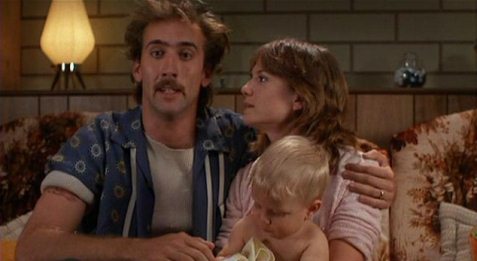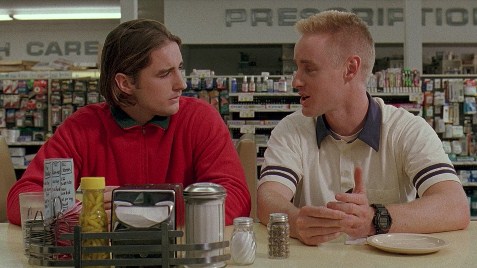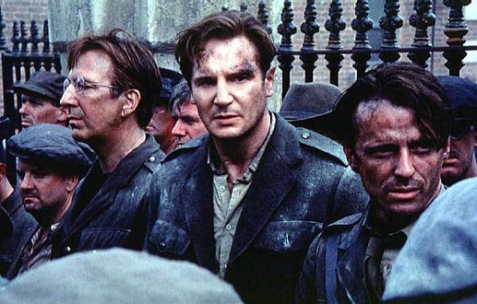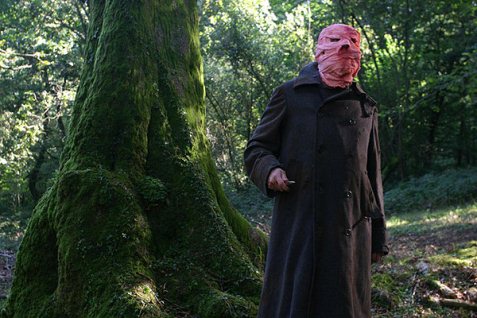Hidden Netflix Gems: Raising Arizona
Posted by Nate Kreichman (02/02/2013 @ 9:00 am)
This week’s Hidden Netflix Gem: Raising Arizona (1987)

Even if you haven’t heard of Joel and Ethan Coen, you’ve sure as hell heard of some of their films. The brothers have jointly written, directed, and produced such modern classics as Fargo, The Big Lebowski, O Brother, Where Art Thou?, No Country for Old Men, and True Grit. Their work bounces around in time, space, and genre—the Coens never make the same movie twice—and they’ve been renowned for it over the past three decades, with 13 Academy Award nominations and four wins.
Before all those accolades, the Coen brothers made their debut with 1984’s Blood Simple, a neo-noir thriller. Not wanting to make a reputation as one-trick ponies, they avowed to make to their next project as different from their first as possible. Out of that desire, the one-of-a-kind screwball comedy Raising Arizona was born.
Our protagonist is Herbert I. “Hi” McDonnough, played by the polarizing Nicolas Cage, who can make or break a movie depending on whether or not he fits his character. Hi is the type of lovable nitwit that often fills Coen fare: an erudite idiot reminiscent of Lebowski’s Dude, if he’d been born in an Arizona trailer park and had a penchant (though not necessarily a skill) for robbing 24-hour convenience stores. Luckily, Cage slips into Hi’s skin masterfully, right down to the wacky hairdo and funny accent (“Temp-ee, Arizona”). The performance remains one of his best to date, although ultimately Adaptation takes the cake.
Opposite Cage is Holly Hunter as the tight-lipped policewoman, Edwina or “Ed,” who’s always taking the recidivist Hi’s mugshot photos. After one particularly fateful arrest, Hi finds Ed in tears and learns that her fiance has left her. He proposes after his latest release from prison, and the two get married and move into a tiny trailer in the Arizona desert, which Hi lovingly calls a “suburban starter home.” One of the film’s many sources of comedy is the contrast between the upbeat world of Hi’s narration and that of the more objective reality we see on screen.
Hi does his best to “stand up and fly straight” after settling into married life, getting a job in a machine shop, but finds it difficult “with that darned Reagan in the White House.” Nonetheless, as time passes, the couple want to take the logical next step and start a family. Unfortunately, “biology is against them,” as they receive the unhappy news that Edwina is “barren,” and they’re denied the chance to adopt because of Hi’s criminal record.
Read the rest of this entry »
Posted in: Entertainment, Movies
Tags: Coen Brothers, Ethan Coen, Hidden Netflix Gems, Hidden Netflix Gems Blog, Holly Hunter, Joel Coen, John Goodman, Nate Kreichman, Nicolas Cage, Raising Arizona, Staff Picks - Movies, William Forsythe
Hidden Netflix Gems: Bottle Rocket
Posted by Nate Kreichman (01/12/2013 @ 4:30 pm)
This week’s Hidden Netflix Gem: “Bottle Rocket” (1996)

Before Wes Anderson was a household name (at least among movie buffs), before receiving Oscar nominations for The Royal Tenenbaums, Fantastic Mr. Fox, and Moonrise Kingdom, before The Darjeeling Limited, Rushmore, and The Life Aquatic, yes, before all of that, he and Owen Wilson co-wrote the screenplay for Bottle Rocket. It was based on a short film of the same name they’d made in 1992 and released in 1994. Bottle Rocket was Anderson’s directorial debut and marked the first appearances of Luke and Owen Wilson, as well as their lesser known older brother, Andrew. Leslie Mann, now famous for her many roles in husband Judd Apatow’s films, even had a small part, though it was eventually left on the cutting room floor.
Anderson’s first film is an interesting look back at the development of filmmaker’s now signature style: the methodical cinematography, with its bright coloring and compulsive need to center-frame the actors, along with humor so dry you’d better pack a canteen. Though a commercial failure, Bottle Rocket served as a launching pad for the careers of all those names above, so easily recognized here in 2013. But the film is worth a watch on its own merits, even for those who aren’t intrigued by the idea of taking a look at the early work of a couple of future A-listers. Thanks to Anderson’s burgeoning style and its innocent, humorous characters, Bottle Rocket has been certified fresh and holds an 80 percent rating on the TomatoMeter. If that’s not enough to sway you, Martin Scorsese named it his seventh favorite movie of the 1990’s. Yes, that Martin Scorsese.
Read the rest of this entry »
Posted in: Entertainment, Movies
Tags: Andrew Wilson, Anthony Adams, Bob Mapplethorpe, Bottle Rocket, Dignan, Futureman, Hidden Netflix Gems, Hidden Netflix Gems Blog, Inez, James Caan, John Mapplethrope, Judd Apatow, Leslie Mann, Luke Wilson, Lumi Cavazos, Mr. Henry, Nate Kreichman, Owen Wilson, Robert Musgrave, Staff Picks - Movies, Wes Anderson
Hidden Netflix Gems: Bernie
Posted by Nate Kreichman (11/10/2012 @ 9:00 am)
This week’s Hidden Netflix Gem: “Bernie” (2011)
When you live in a small town, everybody knows everyone else. They know what you’re like, who your parents were, what you do for a living, whether or not you go to church, and probably a few too many “dirty little secrets” that they use to gossip behind your back. For Bernie Tiede of Carthage, Texas, small town life led to some speculation over whether his effeminate personality indicated he was gay. But it also meant that everybody knew him as the kindest, warmest, friendliest and most generous man they knew. Nobody was more well liked than Bernie.
Then he killed Marjorie Nugent. And despite the logic of that fact, while Bernie Tiede’s life changed, public opinion didn’t.
That’s the stranger than fiction basis of Richard Linklater’s 2011 film “Bernie,” which stars Jack Black in the title role. He’s a 39-year-old assistant funeral director loved by one and all. Kind-hearted soul that he was, he always delivered a gift and checked up on those the deceased left behind. Nobody made him do it, he wasn’t getting paid, he just cared. That habit leads to his befriending 81-year-old millionaire widow Marjorie Nugent, who’s portrayed by Academy Award winner Shirley MacLaine.
Contrary to Bernie, nobody much cares for Mrs. Nugent. Even her own family hates her—she hasn’t spoken to two of her grandchildren in years after they sued her in an effort to get some of her husband’s money. She’s mean, nasty, and entirely lonely, but unwilling to bridge the gap of emotional connection. Until Bernie knocks on her door. Soon they’re eating meals and going on expensive vacations together. Eventually, Tiede even became the sole benefactor of Nugent’s will. She became controlling and jealous. Tiede was on call 24 hours a day, more a servant than a friend, but unable to walk away due to his inherent goodness (not to mention all the money being thrown his way). It was a clash of personalities, and Nugent’s hate beat out Tiede’s love. In a moment of weakness, Tiede snapped and shot Nugent in the back four times.
Read the rest of this entry »
Posted in: Entertainment, Movies
Tags: Bernie, Bernie Tiede, Danny Buck Davidson, Hidden Netflix Gems, Hidden Netflix Gems Blog, Jack Black, Marjorie Nugent, Matthew McConaughey, Nate Kreichman, Richard Linklater, Shirley MacLaine, Staff Picks - Movies, texas
Hidden Netflix Gems: Michael Collins
Posted by Nate Kreichman (10/27/2012 @ 6:25 pm)
This week’s Hidden Netflix Gem: “Michael Collins” (1996)

“Michael Collins” is a 1996 historical biopic starring Liam Neeson as the titular Irish revolutionary. Written and directed by Academy Award winner Neil Jordan, the film won the Golden Lion, the highest prize at the Venice Film Festival, and became the highest-grossing picture of all-time in Ireland upon its release. The high profile cast includes Alan Rickman (Éamon de Valera), Stephen Rea (Ned Broy), Brendan Gleeson (Liam Tobin), and Julia Roberts (Kitty Kiernan).
For those who don’t know, Michael Collins was an Irish revolutionary, military, and political leader who made the liberation of his homeland from its British colonial overlords his life’s work. In the now 90 years since his death (and well before it), his actions made him a folk hero, “The Big Fellah,” the single most important figure in the fight for Irish freedom. As such, “Michael Collins” begins with the following opening crawl:
At the turn of the century Britain was the foremost world power and the British Empire stretched over two-thirds of the globe.
Despite the extent of its power, its most troublesome colony had always been the one closest to it, Ireland.
Read the rest of this entry »
Posted in: Entertainment, Movies
Tags: Alan Rickman, Anglo-Irish Treaty, Biopic, Brendan Gleeson, Éamon de Valera, Hidden Netflix Gems, IRA, Ireland, Irish Civil War, Julia Roberts, Kitty Kiernan, Liam Neeson, Liam Tobin, Michael Collins, Nate Kreichman, Ned Broy, Neil Jordan, Northern Ireland, Staff Picks - Movies, Stphen Rea
Hidden Netflix Gems: Timecrimes
Posted by Nate Kreichman (10/20/2012 @ 9:00 am)
This week’s Hidden Netflix Gem: Timecrimes” (2007)

“Timecrimes” is one of those movies where it seems like giving away anything at all is giving away too much. I’ve included the trailer below out of habit, but if you’d rather not have the film’s twist(s) spoiled, you should avoid it as well as the synopses on Netflix and elsewhere. Even most reviews seem to reveal too much. However, this isn’t an M. Night Shyamalan movie. That is to say spoiling the twist won’t spoil the whole thing. It’s revealed fairly early on and it’s not the only thing the film has going for it.
Here’s what I will say: “Timecrimes” is a Spanish thriller based around time travel. Contrary to many films built on the same idea, “Timecrimes” is extremely low-budget. There is no CGI, one location, and only four speaking roles (one of which is held by writer/director Nacho Vigalondo). Perhaps the film’s most important contrast to its many peers is that the time travel elements do not become convoluted or confusing. “Timecrimes” makes up for its inherent bare bones-ness by maintaining a constant state of tension and forward movement—much like Hector, the main character, the audience has no time to stop and think.
Let’s talk about Hector (Karra Elejalde) then. He’s a middle-aged man in the midst of renovating his home in the Spanish countryside, where he lives with his wife, Clara (Candela Fernández). Hector’s spending his Saturday relaxing in the backyard, looking out into the woods beyond his property through binoculars. There he spies an attractive young woman (Bárbara Goenaga) undressing. His wife leaves to go shopping, and Hector decides to be lead investigator in case of the naked lady. When he finds her, she appears dead, and he’s stabbed by her apparent killer, a mysterious man whose face is wrapped in a pink bandage. Hector runs, ending up in the lab of a scientist played by Vigalondo. Soon after, the scientist convinces Hector to hide from his persuer in a large mechanical device. It’s night time when he gets in, but when he steps out just a few moments later, the sun is shining. Hector has traveled back in time by an hour and a half. And that’s when things really start to get interesting.
Read the rest of this entry »
Posted in: Entertainment, Movies
Tags: Barbara Goenaga, Candela Fernández, Foreign Films, Hidden Netflix Gems, Juan Inciarte, Karra Elejalde, Nacho Vigalondo, Nate Kreichman, science fiction, Staff Picks - Movies, Time Travel














